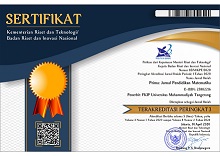Comparison of the Classical Test Theory and the Rasch Model in the Analysis of Mastery Test of Concept Systems of Linear (SPLDV)
Abstract
This study aims to compare the analysis of the quality of a measurement instrument for concept understanding using the classical test theory approach and the Rasch model. The analysis methods for instrument quality, including validity, reliability, item difficulty, and item discrimination, were applied to the SPLDV concept mastery instrument. The research findings reveal differences in the instrument quality between the two approaches. The analysis through the classical test theory approach shows good instrument quality regarding validity and reliability, although item difficulty still needs improvement. On the other hand, the analysis through the Rasch model shows variation in item difficulty and sufficient reliability. While the item discrimination through the classical test theory approach is categorized as good, the analysis through the Rasch model yields unsatisfactory results. In conclusion, the quality of the instrument can differ depending on the approach used. This study provides a better understanding of the differences between the classical test theory approach and the Rasch model in analyzing the quality of a measurement instrument for conceptual understanding.
Keywords
Full Text:
PDFReferences
Arikunto, S. (2015). Dasar-dasar Evaluasi Pendidikan. Jakarta: Bumi Aksara.
Embretson, S. E., & Reise, S. P. (2013). Item response theory. Psychology Press.
Hayati, S., & Lailatussaadah, L. (2016). Validitas dan Reliabilitas Instrumen Pengetahuan Pembelajaran Aktif, Kreatif dan Menyenangkan (Pakem) Menggunakan Model Rasch. Jurnal Ilmiah Didaktika, 16(2), 169– 179. doi: 10.22373/jid.v16i2.593
Lestari, K., & Yudhanegara, M. (2017). Penelitian Pendidikan Matematika. Bandung: PT Refika Aditama.
Marjiastuti, K., & Wahyuni, S. 2014. Analisis Kemampuan Peserta Didik Dengan Model RASCH. Seminar Nasional Evaluasi Pendidikan, 94–102.
Misbah, I.H & Sumintono, B. (2014). Pengembangan dan validasi instrumen "persepsi siswa terhadap karakter moral guru" di Indonesia dengan model rasch, dipresentasikan dalam Seminar Nasional "Pengembangan Instrumen Penilaian Karakter yang Valid" di Fakultas Psikologi, Universitas Muhammadiyah Surakarta
Pisca, C. C. (2014). Analisis Perbandingan Kualitas Butir Soal Ujian Sekolah Bahasa Prancis SMAN 10 Yogyakarta Tahun Ajaran 2013/2014 Dilihat dari Paradigma Klasik dan Modern (PhD Thesis). Universitas Negeri Yogyakarta.
Sugiyono. 2018. Metode Penelitian Kuantitatif, Kualitatif, dan R&D, Cetakan Ke28, Alfabeta, Bandung.
Sumintono , B. & Widhiarso, W. (2014). Aplikasi Model Rasch Untuk Penelitian Ilmu-Ilmu Sosial. Cimahi: Trim Komunikata Publishing House.
Sumintono, B., & Widhiarso, W. (2015). Aplikasi model Rrasch pada Assessment Pendidikan. Cimahi: Trim Komunikata Publishing House.
Syofian. (2015). Metode Penelitian Kuantitatif dilengkapi Perbandingan Perhitungan Manual & SPSS. Jakarta: PRENAMEDIA GROUP.
Tri Wahyuningsih, E. (2015). Analisis Butir Soal Tes Objektif Buatan Guru Ulangan Semester Ganjil Mata Pelajaran Ekonomi Kelas X di Sma Negeri 1 Mlati Tahun Ajaran 2013/2014 (PhD Thesis). Fakultas Ekonomi.
Widhiarso, W. (2016). Penerapan Model Rasch untuk Mengevaluasi Tes UKKS dan UKPS. Tenaga Kependidikan, 1 (1). pp. 50-51.
DOI: http://dx.doi.org/10.31000/prima.v8i2.8647
Article Metrics
Abstract - 1632 PDF - 802Refbacks
- There are currently no refbacks.
Prima: Jurnal Pendidikan Matematika
Program Studi Pendidikan Matematika
Fakultas Keguruan dan Ilmu Pendidikan
Universitas Muhammadiyah Tangerang
Jl. Perintis Kemerdekaan I/33, Cikokol
Kota Tangerang, Indonesia
e-mail: primajpm@gmail.com
Prima: Jurnal Pendidikan Matematika (p-ISSN: 2579-9827 | e-ISSN: 2580-2216) is licensed under a Creative Commons Attribution 4.0 International License.







